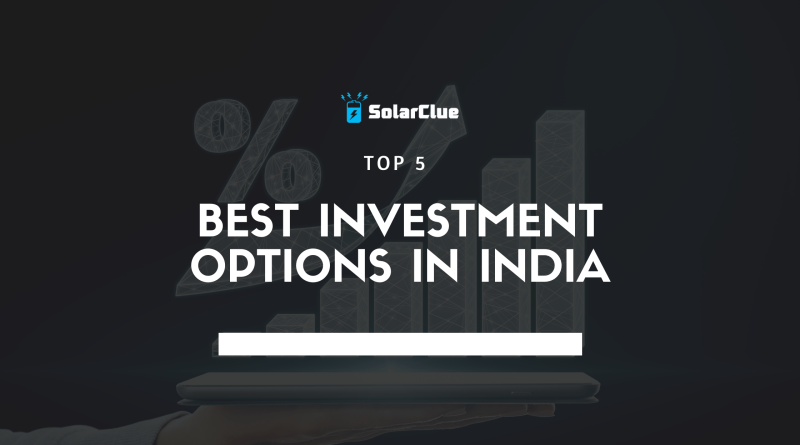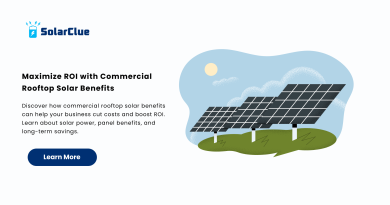Best Investment Options in India
When it comes to investing, most people think of traditional options like fixed deposits, mutual funds, or gold. But have you ever considered solar power as an investment? While solar power systems are often viewed as a way to save on electricity bills, they also deliver impressive financial returns over time. Let’s compare solar power systems with traditional investment options to see which one gives better returns in terms of savings, earnings, and sustainability and it is considered as one of the best investment options in India.
Table of Contents
1. Fixed Deposits (FDs) vs. Solar Power Systems
Fixed Deposits (FDs): A safe investment with guaranteed returns but limited growth potential.
Interest Rate: 6.5-8% annually (varies by bank).
Taxation: Returns are taxable, reducing net earnings.
Liquidity: Fixed for a specific period, with penalties for early withdrawal.
Solar Power Systems: A one-time investment that saves money consistently for decades.
ROI: 20-25% annually, based on electricity savings and net metering earnings.
Tax Benefits: Subsidies and rebates lower the upfront cost.
Lifespan: 25+ years of free electricity after initial payback period.
Winner: Solar power systems deliver higher returns over the long term, making them more cost-effective than FDs.
2. Mutual Funds vs. Solar Power Systems
Mutual Funds: Offer higher returns but come with market risks.
Returns: 12-15% annually (on average for equity funds).
Risk: Returns depend on market performance.
Taxation: Long-term capital gains tax (LTCG) applies.
Solar Power Systems: Provide predictable returns through savings and income from excess electricity.
Returns: Consistent savings that are unaffected by market volatility.
Risk: Minimal, as solar systems have a long lifespan and warranties.
Sustainability: Solar reduces your carbon footprint, which mutual funds cannot do.
Winner: Mutual funds may yield higher short-term returns, but solar power systems offer steady, risk-free savings over decades.
3. Gold vs. Solar Power Systems
Gold: A traditional safe-haven asset that appreciates over time.
Returns: 8-12% annually (based on historical trends).
Volatility: Prices fluctuate with global markets.
Utility: Acts as a store of value but doesn’t generate income.
Solar Power Systems: Provide both utility (electricity) and financial benefits.
Savings: Reduce electricity bills by 70-90%, depending on usage.
Earnings: Generate income through net metering policies.
Sustainability: Contribute to a cleaner planet, unlike gold.
Winner: Solar power systems provide dual benefits—monetary savings and energy independence—making them a more practical choice for daily life.
4. Real Estate vs. Solar Power Systems
Real Estate: Offers significant returns but comes with high upfront costs and market risks.
Returns: 8-10% annually (appreciation and rental income).
Liquidity: Difficult to sell quickly.
Taxation: Subject to capital gains tax.
Solar Power Systems: Require a much smaller upfront investment and start delivering returns immediately.
Returns: Savings and income equivalent to 20-25% ROI annually.
Liquidity: Immediate financial benefits through reduced electricity bills.
Tax Benefits: Subsidies reduce the initial cost, and net metering generates income.
Winner: Solar power systems are more accessible and offer faster, consistent returns compared to real estate.
5. Stock Market vs. Solar Power Systems
Stock Market: High-risk, high-reward option that requires active management.
Returns: 10-15% annually (historical average for long-term investments).
Risk: Highly volatile and influenced by market conditions.
Taxation: Gains are taxable under LTCG rules.
Solar Power Systems: Provide guaranteed returns without market dependency.
Savings: Predictable savings on electricity bills every month.
Risk: Minimal, as solar systems have warranties and low maintenance requirements.
Sustainability: Solar is an eco-friendly investment, unlike stocks.
Winner: Solar power systems are a safer option with consistent returns, especially for risk-averse individuals.
Long-Term Returns Comparison
| Investment Option | Average Annual Returns | Risk Level | Tax Benefits | Sustainability | Lifespan/Duration |
|---|---|---|---|---|---|
| Solar Power Systems | 20-25% (via savings) | Very Low | Subsidies available | High | 25+ years |
| Fixed Deposits | 6.5-8% | Very Low | Limited | Low | 5-10 years |
| Mutual Funds | 12-15% | Moderate | Tax deductions (ELSS) | Low | Depends on market |
| Gold | 8-12% | Low to Moderate | None | Low | Unlimited |
| Stock Market | 10-15% | High | Tax on LTCG | Low | Depends on strategy |
Why Solar Power Systems Outperform Traditional Investments
1. Guaranteed Returns: Solar power systems offer consistent savings and income through net metering, unaffected by market risks.
2. Short Payback Period: Most solar installations pay for themselves in 5-7 years, after which the electricity savings are pure profit.
3. Tax Benefits: Subsidies and tax rebates make solar power systems even more affordable.
4. Environmentally Friendly: Solar not only saves money but also contributes to reducing your carbon footprint.
5. Dual Benefits: While traditional investments focus solely on financial returns, solar power systems provide both economic and practical benefits (free electricity and energy independence).
Conclusion:
While traditional investments like FDs, mutual funds, and real estate have their place, solar power systems offer a unique combination of financial returns, long-term savings, and environmental benefits. By switching to solar, you’re not only making a smart financial decision but also contributing to a sustainable future.
Make the Switch with SolarClue
If you’re ready to invest in solar power, SolarClue is here to help.
We provide:
✅ Top brands like Tata Power Solar, Vikram Solar, and Luminous.
✅ Personalized solutions tailored to your energy needs.
✅ Expert guidance on government subsidies and net metering policies.
✅ Hassle-free installation and support.
Start saving today with SolarClue and power your future with the sun! 🌞



